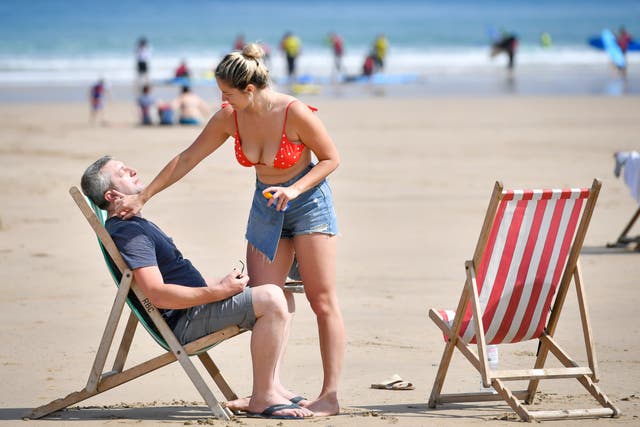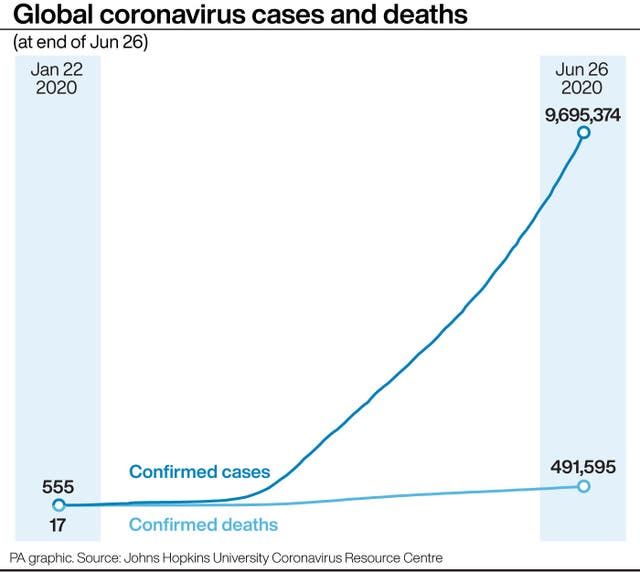
Foreign holidays have been given the green light after ministers confirmed the requirement to self-isolate for 14 days upon returning to the UK will be scrapped for a slew of popular destinations.
Trips to France, Greece and Spain look on the cards after the Government confirmed it will revise the quarantine measures next week.
In place of the quarantine arrangements will be a traffic light system, with officials placing countries into green, amber and red categories based on the prevalence of coronavirus within each nation’s borders.
The Telegraph reported that as many as 50 countries could be included in the quarantine-free list when it is published on Wednesday, with restrictions lifted as soon as July 6.
The Foreign Office is also set to lift its caution against all but essential travel for those countries in the green and amber categories to coincide with the announcement, thereby reducing travel insurance premiums.
Only passengers arriving into the UK from nations in the red category, where the spread of coronavirus is deemed to be high, will be told to self-isolate for two weeks, under the fresh proposals.
Despite being touted by the Government as a country which could benefit from the new arrangements in little over a week’s time, Greek tourism minister Haris Theoharis indicated it could be up to three weeks before his country was happy to open up unrestricted travel with the UK.
He told BBC Breakfast: “I feel the way things are now – and we always have to put this asterisk that the health situation has to continue to be on the same track as it is now – that we can certainly lift the restrictions in the next few days or, you know, two to three weeks.”
Ministers have warned countries could fall into the unsafe category if there are sudden outbreaks, meaning holidaymakers could return to find they unexpectedly have to lock themselves away for 14 days.
 Foreign holidays look back on the cards after the Government signalled travel quarantine restrictions are due to end next month (Ben Birchall/PA)
Foreign holidays look back on the cards after the Government signalled travel quarantine restrictions are due to end next month (Ben Birchall/PA)
A Government spokeswoman said: “Our new risk-assessment system will enable us to carefully open a number of safe travel routes around the world – giving people the opportunity for a summer holiday abroad and boosting the UK economy through tourism and business.
“But we will not hesitate to put on the brakes if any risks re-emerge, and this system will enable us to take swift action to reintroduce self-isolation measures if new outbreaks occur overseas.”
The quarantine measures have come in for heavy criticism since they were brought in this month.
Since June 8, all passengers – bar a handful of exemptions – have been required to go into self-isolation for a fortnight at a declared address when they arrive in the UK.
 (PA Graphics)
(PA Graphics)
Those who fail to comply can be fined £1,000 in England, and police are allowed to use “reasonable force” to make sure they follow the rules.
The International Consolidated Airlines Group (IAG) branded the blanket quarantine measures “illogical” and budget airline Ryanair labelled them “idiotic rubbish”.
But, with Home Secretary Priti Patel promising to review the restrictions every three weeks, the Government has signalled that the quarantine will be lifted for a host of destinations in time for the holiday season.
Jonathan Smith, a spokesman for the Association of British Travel Agents (Abta), said the organisation welcomed the “risk-based approach” taken by the Government.
Speaking to BBC Radio 4’s Today programme, he said: “I think this is incredibly welcome news for the travel industry, which has had a very difficult time these weeks and months, and will encourage people to book and allow them to enjoy a summer holiday.”
Mr Smith said the industry expected “a surge in bookings” but predicted more travel companies were likely to go bust before a full recovery was felt.


Why are you making commenting on The Herald only available to subscribers?
It should have been a safe space for informed debate, somewhere for readers to discuss issues around the biggest stories of the day, but all too often the below the line comments on most websites have become bogged down by off-topic discussions and abuse.
heraldscotland.com is tackling this problem by allowing only subscribers to comment.
We are doing this to improve the experience for our loyal readers and we believe it will reduce the ability of trolls and troublemakers, who occasionally find their way onto our site, to abuse our journalists and readers. We also hope it will help the comments section fulfil its promise as a part of Scotland's conversation with itself.
We are lucky at The Herald. We are read by an informed, educated readership who can add their knowledge and insights to our stories.
That is invaluable.
We are making the subscriber-only change to support our valued readers, who tell us they don't want the site cluttered up with irrelevant comments, untruths and abuse.
In the past, the journalist’s job was to collect and distribute information to the audience. Technology means that readers can shape a discussion. We look forward to hearing from you on heraldscotland.com
Comments & Moderation
Readers’ comments: You are personally liable for the content of any comments you upload to this website, so please act responsibly. We do not pre-moderate or monitor readers’ comments appearing on our websites, but we do post-moderate in response to complaints we receive or otherwise when a potential problem comes to our attention. You can make a complaint by using the ‘report this post’ link . We may then apply our discretion under the user terms to amend or delete comments.
Post moderation is undertaken full-time 9am-6pm on weekdays, and on a part-time basis outwith those hours.
Read the rules here